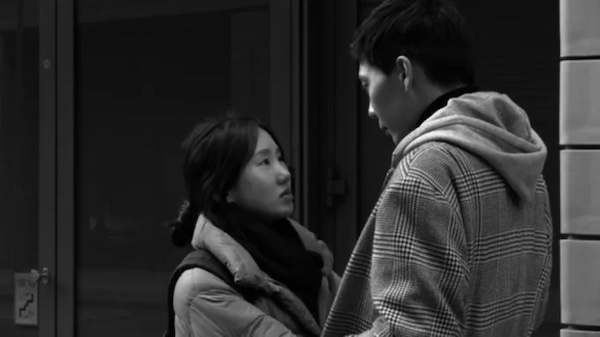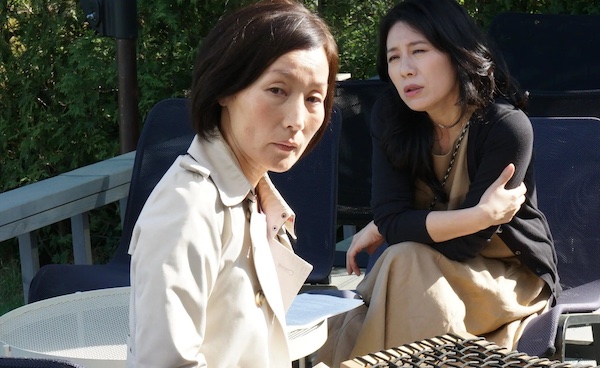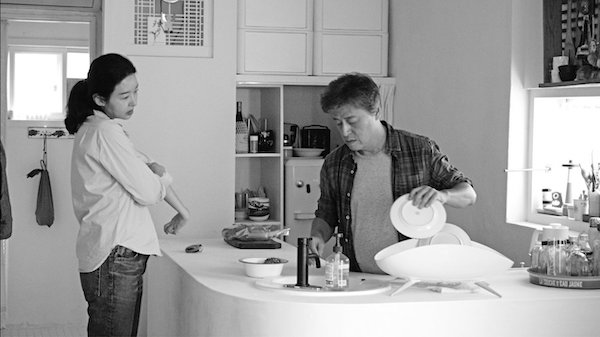Film Series Reviews: “Still Life with Hong Sangsoo” — Tingly Comedies of Discomfort
By Betsy Sherman
Whereas Hong Sangsoo’s filmography abounds with coming-of-age stories featuring young characters embarking on their romantic/sexual and professional lives, two of these three films spotlight middle-aged characters, with one specifically dealing with disease and mortality.
Still Life with Hong Sangsoo – A film series at the Harvard Film Archive, Cambridge, from April 21-May 14.
Five years after its delightful retrospective The Moral Tales of Hong Sangsoo, the Harvard Film Archive catches us up on recent work by the prolific art-house favorite from South Korea with a seven-film series called Still Life with Hong Sangsoo. The allusion to painting can be found in the essay about the series by filmmaker Matías Piñeiro in the HFA schedule. He tells of Hong’s fixation, when he was studying at the Art Institute of Chicago, on a particular still life by Paul Cézanne. But I also hear “still life” as a reference to a timeline (2018-2022) that includes the pandemic: we’re “still alive,” although obviously not all of “us” are.
The three films showing on opening weekend — Introduction, In Front of Your Face and Walk Up — exhibit a slight shift in the 62-year-old auteur’s preoccupations. Whereas his filmography abounds with coming-of-age stories featuring young characters embarking on their romantic/sexual and professional lives, two of these three films spotlight middle-aged characters, with one specifically dealing with disease and mortality.
Piñeiro notes that “Hong’s project goes beyond any single film. It is a home with many rooms inviting you to spend time within them.” Indeed, Hong’s films, numbering now around 30, are variations on themes, narrative- and aesthetic-wise. They concern a small group of characters (with favorite actors making repeat appearances), communing and kvetching, often in cafés, bars, and restaurants. A favored composition is two seated actors in profile, a table between them, their conversation captured in a long-duration shot. Cigarettes and alcohol aren’t only there to fuel the characters (drink frees the tongue, and the body). They mark time, as ashtrays fill up with butts and empty bottles proliferate on table tops. Female proprietors or workers in these establishments become figures of infatuation for Hong’s male characters.
The protagonist will often be a filmmaker, film student, or actor, hinting that plots or subplots might be autobiographical. The films are witty and playful, with red herrings and moments where you wait for the other shoe to drop (it doesn’t always). Hong mines comedy from discomfort; often a dam of repressed emotion will burst (after a few drinks, of course), with dire consequences. But there’s also an undercurrent of melancholy, as characters become obsessed with lost loves, missed opportunities, and other disappointments.
Shot on very low budgets, with tight schedules, using a system whereby the actors work from script pages that Hong has written early that same morning (they’re free to improvise), Hong’s movies come to us as little miracles. By the end of many of them, I get a tingle, impressed by the way its truthful slice of life has improbably moved me.

Shin Seokho as Youngho and Park Miso as Juwon in a scene from Introduction. Photo: Jeonwonsa Film Co. Prod.
The 66-minute, black-and-white 2021 Introduction (screening Friday, April 21, at 9 p.m.) evades attempts to summarize what it’s “about.” In a sense, it’s about the lead male character’s ability to execute — or not — a hug. This is one of Hong’s coming-of-age pictures, featuring subtle performances by Shin Seokho as Youngho and Park Miso as Juwon. They’re a couple whom we meet on the verge of a brief separation: Youngho is dropping by the office of his father, an acupuncturist (who’s undergoing some mysterious crisis). We find out later they’re on the verge of a huge separation, as the mid-section of the movie depicts Juwon in Germany, where she’ll study fashion.
They’re both reticent about crossing a threshold into independence: each tells an older person who addresses them in formal language that they can use informal speech with them, because they’re young. Youngho has a sentimental reunion with his father’s receptionist, whom he seems to have had a crush on when he was a kid; she accepts his big hug. When Youngho makes a surprise visit to Germany before Juwon has even settled in, let alone been able to spread her wings, her politeness leads her to say things — and accept a hug, which she previously avoided — that may not reflect her real feelings about his clinginess.
The final act unfolds in a Korean seaside setting, where Youngho and a friend go to have lunch with Youngho’s mother and her companion, an elderly theater actor. His mother wants an assessment of whether her son, who’s been dabbling in acting, has a future in it. The meal goes from comically awkward to disastrous, but we learn something about Youngho that transforms him from icky to endearing in our eyes. A fantastical scene on the beach and bracing contact with the water lead to another hug and the breaking of tension. As many a filmmaker has demonstrated (including one of Hong’s idols, Yasujiro Ozu), lyrical shots of the ocean can help induce a feeling of transcendence. This one gave me the improbable tingle.

Lee Hyeyoung, left, and Cho Yunhee in In Front of Your Face. Photo: Cinema Guild
The 2021 In Front of Your Face (screening Sunday, April 23, at 3 p.m. and Sunday, May 7, at 3 p.m.) makes robust use of color to display nature’s treasures. It’s an affecting drama, with comic touches, centering on a woman around the same age as the director. Hong uses the story to link mortality and cinephilia.
Sangok (a superb performance by Lee Hyeyoung), who has lived in the US for many years, is back in South Korea for a visit, staying with her empty-nester sister Jeongok (Cho Yunhee) in a high-rise apartment building. The action takes place over the course of one day. Early on, a voice-over of Sangok praying includes the words “thank you for sparing me pain.” We can infer the health ordeal that Sangok is, so far, keeping to herself. The sisters spend the morning together, having breakfast on a patio with a river view, and strolling through the park. Jeongok muses about how much she and Sangok don’t know about each other. She still harbors resentment about her sister leaving, but hopes she will move back. Sangok seems ambivalent about life on either side of the world. She grumbles about having to meet a man for lunch.
Before reaching the lunch destination, Sangok has the taxi driver make a diversion. This visit, to the sisters’ childhood home, is of course also a poignant visit to the past. It joins a hallowed cinematic tradition of such scenes, encompassing movies as disparate as Wild Strawberries and Spenser.
Her lunch meeting is with movie director Song Jaewon (Kwon Haehyo), who had contacted her with a proposition. Sangyo had acted in a few films in her youth, before she left Korea. Song explains that, when he was a university freshman, her performance in one film “engraved itself in my heart.” He asks if she’ll agree to make a movie with him, because he longs to create a “character that has your strength and light.” Sangyo waffles.
In a remarkable scene, captured in an uninterrupted 11-minute shot, Song finds out what Sangyo means when she says she doesn’t have time to make his movie. It contains revelations, reactions, tears (his), laughter (hers), refilling of shot glasses, phantom-like figures passing by the window behind them, and Sangok picking out on a guitar Christian Petzold’s Minuet in G Major, remembered from a long-ago lesson. What it doesn’t contain is a sappy monologue; instead, Sangok shares her hope that she can continue to focus on the present moment, that is, what’s in front of her face. By the time they leave, it has started to rain, and the two have a very tingle-y shared moment under an umbrella. Sangyo, for however brief a time, was an artist, and despite her life’s difficulties, she will leave a trace with the films she made.
A detail about that sequence in the bar points to another Hong film, and a possible inspiration for the story. The closed bar they meet in is called Novel, owned by a female friend of Song’s; she’s away and has lent him the keys to open it. In the 2011 The Day He Arrives there’s also a bar called Novel; the protagonist becomes attracted to the woman owner. She was played by Kim Bokyung, who died of liver cancer in 2021. In another off-screen resonance, lead actress Lee Hyeyoung is the daughter of the late director Lee Manhee, who was an influence on Hong Sangsoo (Hong’s mother produced some of Lee’s films, so he made set visits when he was a child).

A scene from Walk Up. Photo: Vienna International Film Festival
The 2022 black-and-white Walk Up (screening Friday, April 21, at 7 p.m. and Sunday, Apr. 23, at 7 p.m.) presents a concreteness of space — the walk-up apartment building of the title — and an ambiguity of time. On the surface, it’s a variation on the kind of romantic comedy where a passive man is the object of attraction of a series of women. Here, the potential lovers are middle-aged and successful in their professional lives.
Byungsoo is a film director who pays a call on acquaintance Ms. Kim, an interior designer, with his daughter, because she’s interested in the field as a career (Kwon Haehyo and Lee Hyeyoung from In Front of Your Face reunite, with Park Miso from Introduction as the daughter). Ms. Kim owns the building, and gives the father and daughter a tour, using the staircase that we’ll see a lot of in this movie. By the time they get from her basement office to the fourth floor, Ms. Kim — who really wants to get to know Byungsoo better — has made a date with him to eat at the restaurant on the second floor, suggested that he might want to rent the third floor as a work space, and offered him the top floor, a cramped artist’s studio, rent-free.
The director is estranged from his wife and hadn’t seen his daughter Jeongsu for five years. After he leaves, Jeongsu and Ms. Kim begin their discussion and a bottle of wine. The topic turns from career advice to Byungsoo and his private life. The younger woman becomes less shy under the influence, expressing her resentment toward her father. He used to be a homebody, she says, “scared of everything … like a child.” She finds it hard to take that he’s now admired by the world. Ms. Kim responds with, essentially, the movie’s thesis statement: “He’s not only who he is at home.… We’re all different when we go out. We’re different inside and outside. Maybe the person he is when he’s outside is more genuine. You want to believe the person you see at home is the real him.”
An undefined amount of time passes — part of being a Hong fan is adjusting to not knowing how long it’s been since the last bit of action, or even if the next part might have taken place before it. In Walk Up, a jump in time is signaled by tinny guitar on the soundtrack (though that may not be consistent). Byungsoo returns to the building for lunch with Ms. Kim at the second floor restaurant, run by Sunhee (Song Sunmi). The proprietor/chef joins them for a chat about how much she likes Byungsoo’s films, her original ambition to be a painter and why she gave that up, and her Christian faith. To the probable consternation of Ms. Kim, there are sparks between the director and the chef.
From then on, Byungsoo’s future lies within the walk-up. Some more tinny guitar music, and he’s living there with Sunhee, discussing the stuff of everyday life. And, as we’ve been tipped off, the “inside” Byungsoo is, if not quite scared of everything, needy and manipulative (he sends a comically pathetic text to Sunhee when she’s out trying to have a bit of an outside life herself). Cue the tinny guitar music and he’s living on the top floor where new lover Jiyoung (Cho Yunhee), a real estate agent, helps soothe his various physical ailments with maternal devotion. And he’s talking about taking a couple of years off from filmmaking.
Walk Up is amusing, and as visually pleasing as any of Hong’s films, with its studies of interior spaces, glimpses of exteriors, and questions about the in-betweens (leaning one’s self out the window to smoke — interior or exterior?). There’s a possibility that all these women — heck, even the daughter — could be figments of Byungsoo’s imagination. It didn’t give me the tingle. But Hong already has one movie out, so far, in 2023, that could be tingleworthy.
Betsy Sherman has written about movies, old and new, for the Boston Globe, Boston Phoenix, and Improper Bostonian, among others. She holds a degree in archives management from Simmons Graduate School of Library and Information Science. When she grows up, she wants to be Barbara Stanwyck.


Thanks, Betsy, for taking time to compose a major article on the great Hong Sang-soo. He’s my favorite director in the world and I am at home in his tiny universe. So glad that you “get him” and, quite an achievement, can articulate what is happening in his subtle, talk-filled, drink-filled stories.